

The Twelve Labors are a series of archaic episodes connected by a later continuous narrative, concerning a penance carried out by Hercules, the greatest of the Greek heroes.
The goddess Hera, determined to make trouble for Hercules, made him lose his mind. In a confused and angry state, he killed his own wife and children.
When he awakened from his "temporary insanity," Hercules was shocked and upset by what he'd done. He prayed to the god Apollo for guidance, and the god's oracle told him he would have to serve Eurystheus, the king of Tiryns and Mycenae, for twelve years, in punishment for the murders.
As part of his sentence, Hercules had to perform twelve Labors, feats so difficult that they seemed impossible. Fortunately, Hercules had the help of Hermes and Athena, sympathetic deities who showed up when he really needed help. By the end of these Labors, Hercules was, without a doubt, Greece's greatest hero.
His struggles made Hercules the perfect embodiment of an idea the Greeks called pathos, the experience of virtuous struggle and suffering which would lead to fame and, in Hercules' case, immortality.
The traditional order of the labors is:
1. Slay the Nemean Lion and bring back its skin.
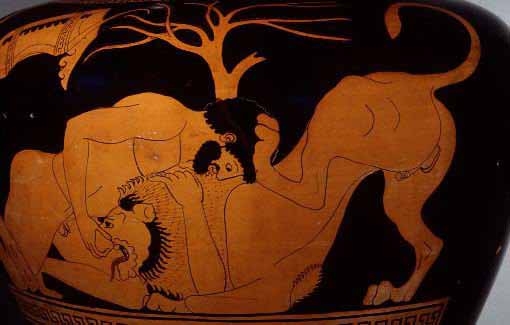
When Hercules got to Nemea and began tracking the terrible lion, he soon discovered his arrows were useless against the beast. Hercules picked up his club and went after the lion. Following it to a cave which had two entrances, Hercules blocked one of the doorways, then approached the fierce lion through the other. Grasping the lion in his mighty arms, and ignoring its powerful claws, he held it tightly until he'd choked it to death.
Hercules returned to Cleonae, carrying the dead lion, and found Molorchus on the 30th day after he'd left for the hunt. Instead of sacrificing to Hercules as a dead man, Molorchus and Hercules were able to sacrifice together, to Zeus.
When Hercules made it back to Mycenae, Eurystheus was amazed that the hero had managed such an impossible task. The king became afraid of Hercules, and forbade him from entering through the gates of the city. Furthermore, Eurystheus had a large bronze jar made and buried partway in the earth, where he could hide from Hercules if need be. After that, Eurystheus sent his commands to Hercules through a herald, refusing to see the powerful hero face to face.
Many times we can identify Hercules in ancient Greek vase paintings or sculptures simply because he is depicted wearing a lion skin. Ancient writers disagreed as to whether the skin Hercules wore was that of the Nemean lion, or one from a different lion, which Hercules was said to have killed when he was 18 years old. The playwright Euripides wrote that Hercules' lion skin came from the grove of Zeus, the sanctuary at Nemea.
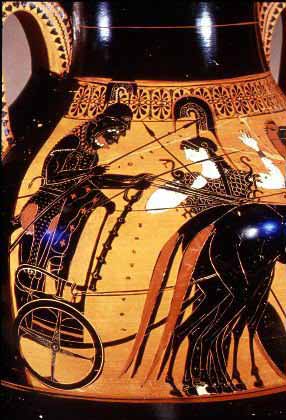
Hercules set off to hunt the nine-headed menace, but he did not go alone. His trusty nephew, Iolaus, was by his side. Iolaus, who shared many adventures with Hercules, accompanied him on many of the twelve labors. Legend has it that Iolaus won a victory in chariot racing at the Olympics and he is often depicted as Hercules' charioteer. So, the pair drove to Lerna and by the springs of Amymone, they discovered the lair of the loathsome hydra.
First, Hercules lured the coily creature from the safety of its den by shooting flaming arrows at it. Once the hydra emerged, Hercules seized it. The monster was not so easily overcome, though, for it wound one of its coils around Hercules' foot and made it impossible for the hero to escape. With his club, Hercules attacked the many heads of the hydra, but as soon as he smashed one head, two more would burst forth in its place! To make matters worse, the hydra had a friend of its own: a huge crab began biting the trapped foot of Hercules. Quickly disposing of this nuisance, most likely with a swift bash of his club, Hercules called on Iolaus to help him out of this tricky situation.
Each time Hercules bashed one of the hydra's heads, Iolaus held a torch to the headless tendons of the neck. The flames prevented the growth of replacement heads, and finally, Hercules had the better of the beast. Once he had removed and destroyed the eight mortal heads, Hercules chopped off the ninth, immortal head. This he buried at the side of the road leading from Lerna to Elaeus, and for good measure, he covered it with a heavy rock. As for the rest of the hapless hydra, Hercules slit open the corpse and dipped his arrows in the venomous blood.
Eurystheus was not impressed with Hercules' feat, however. He said that since Iolaus had helped his uncle, this labor should not count as one of the ten. This technicality didn't seem to matter much to anyone else: the ancient authors still give Hercules all of the credit. Even so, Pausanias did not think that this labor was as fantastic as the myths made it out to be: to him, the fearsome hydra was a big water snake.
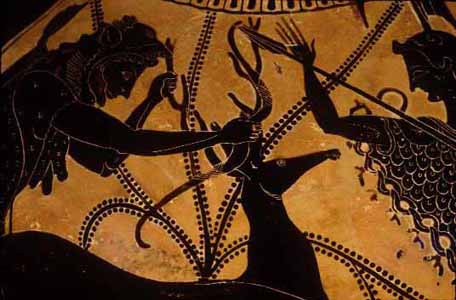
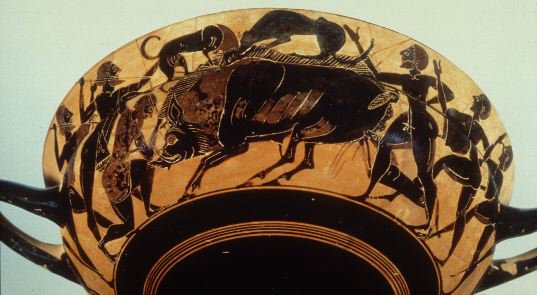
On his way to hunt the boar, Hercules stopped to visit his friend Pholus, who was a centaur and lived in a cave near Mount Erymanthus. Everyone knows that centaur is a human from his head to his waist, and a horse for the rest of his body and his legs. Hercules was hungry and thirsty, so the kindly centaur cooked Hercules some meat in the fireplace, while he himself ate his meat raw.
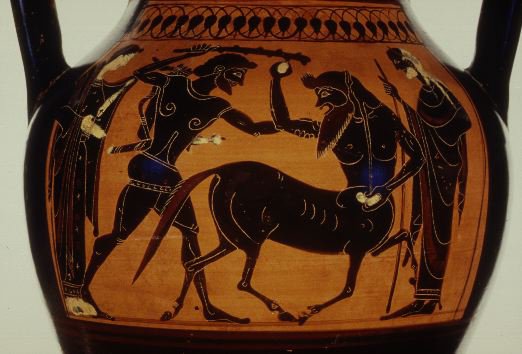
When Hercules asked for wine, Pholus said that he was afraid to open the wine jar, because it belonged to all the centaurs in common. But Hercules said not to worry, and opened it himself.
Soon afterwards, the rest of the centaurs smelled the wine and came to Pholus's cave. They were angry that someone was drinking all of their wine. The first two who dared to enter were armed with rocks and fir trees.
He shot arrows at the rest of them and chased after them for about twenty miles. The rest of the centaurs fled in different directions. One of the centaurs, Chiron, received a wound that no amount of medicine would heal...but what happened to Chiron is another story.
While Hercules was gone, Pholus pulled an arrow from the body of one of the dead centaurs. He wondered that so little a thing could kill such a big creature. Suddenly, the arrow slipped from his hand. It fell onto his foot and killed him on the spot. So when Hercules returned, he found Pholus dead. He buried his centaur friend, and proceeded to hunt the boar.
It wasn't too hard for Hercules to find the boar. He could hear the beast snorting and stomping as it rooted around for something to eat. Hercules chased the boar round and round the mountain, shouting as loud as he could. The boar, frightened and out of breath, hid in a thicket. Hercules poked his spear into the thicket and drove the exhausted animal into a deep patch of snow.
Then he trapped the boar in a net, and carried it all the way to Mycenae. Eurystheus, again amazed and frightened by the hero's powers, hid in his partly buried bronze jar.
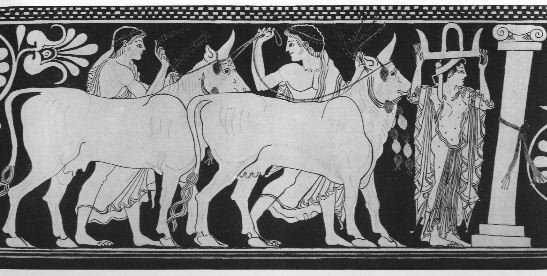
Now King Augeas owned more cattle than anyone in Greece. Some say that he was a son of one of the great gods, and others that he was a son of a mortal; whosever son he was, Augeas was very rich, and he had many herds of cows, bulls, goats, sheep and horses.
Every night the cowherds, goatherds and shepherds drove the thousands of animals to the stables.
Hercules went to King Augeas, and without telling anything about Eurystheus, said that he would clean out the stables in one day, if Augeas would give him a tenth of his fine cattle.
Augeas couldn't believe his ears, but promised. Hercules brought Augeas's son along to watch. First the hero tore a big opening in the wall of the cattle-yard where the stables were. Then he made another opening in the wall on the opposite side of the yard.
Next, he dug wide trenches to two rivers which flowed nearby. He turned the course of the rivers into the yard. The rivers rushed through the stables, flushing them out, and all the mess flowed out the hole in the wall on other side of the yard.
When Augeas learned that Eurystheus was behind all this, he would not pay Hercules his reward. Not only that, he denied that he had even promised to pay a reward. Augeas said that if Hercules didn't like it, he could take the matter to a judge to decide.
The judge took his seat. Hercules called the son of Augeas to testify. The boy swore that his father had agreed to give Hercules a reward. The judge ruled that Hercules would have to be paid. In a rage, Augeas ordered both his own son and Hercules to leave his kingdom at once. So the boy went to the north country to live with his aunts, and Hercules headed back to Mycenae. But Eurystheus said that this labour didn't count, because Hercules was paid for having done the work.
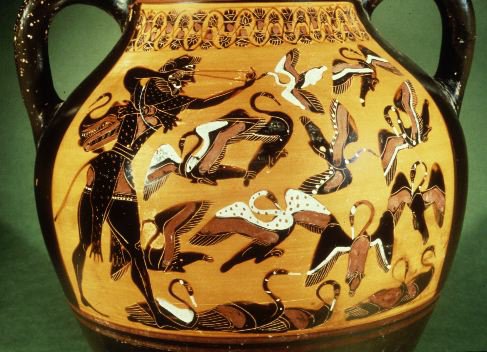
Arriving at the lake, which was deep in the woods, Hercules had no idea how to drive the huge gathering of birds away. The goddess Athena came to his aid, providing a pair of bronze krotala, noisemaking clappers similar to castanets. These were no ordinary noisemakers. They had been made by an immortal craftsman, Hephaistos, the god of the forge.
Climbing a nearby mountain, Hercules clashed the krotala loudly, scaring the birds out of the trees, then shot them with bow and arrow, or possibly with a slingshot, as they took flight.
Some versions of the legend say that these Stymphalian birds were vicious man-eaters. The 2nd century A.D. travel writer, Pausanias, trying to discover what kind of birds they might have been, wrote that during his time a type of bird from the Arabian desert was called "Stymphalian," describing them as equal to lions or leopards in their fierceness. He speculated that the birds Hercules encountered in the legend were similar to these Arabian birds.
Pausanias also saw and described the religious sanctuary built by the Greeks of Stymphalos and dedicated to the goddess Artemis. He reported that the temple had carvings of the Stymphalian birds up near its roof. Standing behind the temple, he saw marble statues of maidens with the legs of birds.
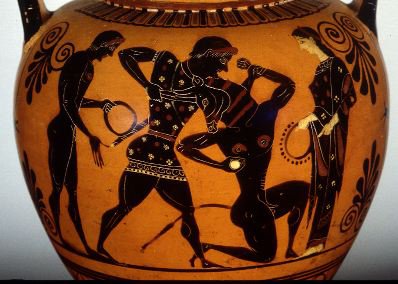
Minos himself, in order to prove his claim to the throne, had promised the sea-god Poseidon that he would sacrifice whatever the god sent him from the sea. Poseidon sent a bull, but Minos thought it was too beautiful to kill, and so he sacrificed another bull. Poseidon was furious with Minos for breaking his promise. In his anger, he made the bull rampage all over Crete, and caused Minos' wife Pasiphae to fall in love with the animal. As a result, Pasiphae gave birth to the Minotaur, a monster with the head of a bull and the body of a man. Minos had to shut up this beast in the Labyrinth, a huge maze underneath the palace, and every year he fed it prisoners from Athens.
When Hercules got to Crete, he easily wrestled the bull to the ground and drove it back to King Eurystheus. Eurystheus let the bull go free. It wandered around Greece, terrorizing the people, and ended up in Marathon, a city near Athens.
The Athenian hero Theseus tied up some loose ends of this story. He killed the Cretan Bull at Marathon. Later, he sailed to Crete, found his way to the center of the Labyrinth, and killed the Minotaur.
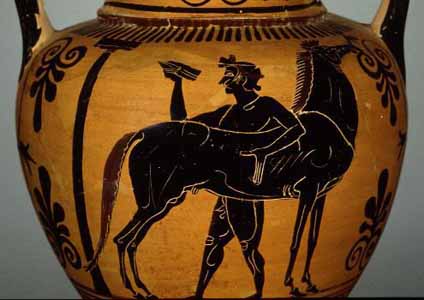
According to Apollodorus, Hercules sailed with a band of volunteers across the Aegean to Bistonia. There he and his companions overpowered the grooms who were tending the horses, and drove them to the sea. But by the time he got there, the Bistones had realized what had happened, and they sent a band of soldiers to recapture the animals. To free himself to fight, Hercules entrusted the mares to a youth named Abderos.
Meanwhile Hercules fought the Bistones, killed Diomedes, and made the rest flee. In honor of the slain Abderos, Hercules founded the city of Abdera.
The hero took the mares back to Eurystheus, but Eurystheus set them free. The mares wandered around until eventually they came to Mount Olympos, the home of the gods, where they were eaten by wild beasts.
Euripides gives two different versions of the story, but both of them differ from Apollodorus's in that Hercules seems to be performing the labor alone, rather than with a band of followers. In one, Diomedes has the four horses harnessed to a chariot, and Hercules has to bring back the chariot as well as the horses. In the other, Hercules tames the horses from his own chariot:
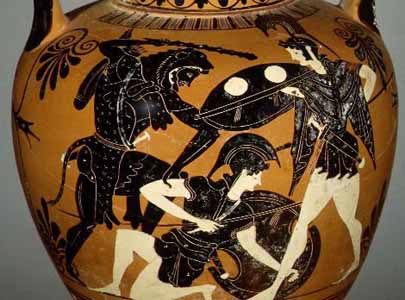
These Amazons had nothing to do with the Amazon river in South America. Their name comes from a Greek word meaning "missing one breast." This is because an Amazon's right breast got in the way when she threw a spear.
The Amazons lived apart from men, and if they ever gave birth to children, they kept only the females and reared them to be warriors like themselves.
Queen Hippolyte had a special piece of armor. It was a leather belt that had been given to her by Ares, the war god, because she was the best warrior of all the Amazons. She wore this belt across her chest and used it to carry her sword and spear. Eurystheus wanted Hippolyte's belt as a present to give to his daughter, and he sent Hercules to bring it back.
Hercules' friends realized that the hero could not fight against the whole Amazon army by himself, so they joined with him and set sail in a single ship.
She asked Hercules why he had come, and when he told her, she promised to give him the belt. But the goddess Hera knew that the arrival of Hercules meant nothing but trouble for the Amazons. Disguised as an Amazon warrior, Hera went up and down the army saying to each woman that the strangers who had arrived were going to carry off the queen. So the Amazons put on their armor.
But when Hercules saw that they were wearing their armor and were carrying their weapons, he knew that he was under attack. Thinking fast, he drew his sword and killed Hippolyte.
Then he undid her belt and took it away from her. Hercules and the Greeks fought the rest of the Amazons in a great battle.
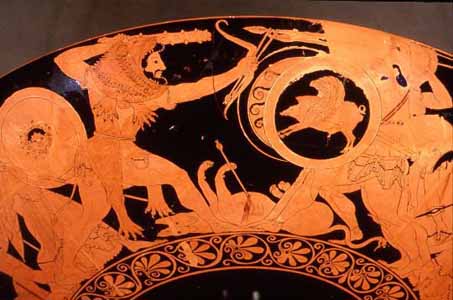
Geryon lived on an island called Erythia, which was near the boundary of Europe and Libya. On this island, Geryon kept a herd of red cattle guarded by Cerberus' brother, Orthus, a two-headed hound, and the herdsman Eurytion. Hercules set off on for Erythia, encountering and promptly killing many wild beasts along the way, and he came to the place where Libya met Europe. Here, Apollodorus tells us, Hercules built two massive mountains, one in Europe and one in Libya, to commemorate his extensive journey. Other accounts say that Hercules split one mountain into two. Either way, these mountains became known as the Gates or Pillars of Hercules. The strait Hercules made when he broke the mountain apart is now called the Strait of Gibraltar, between Spain and Morocco, the gateway from the Mediterranean Sea to the Atlantic Ocean.
Sailing in a goblet which the Sun gave him in admiration, Hercules reached the island of Erythia. Not long after he arrived, Orthus, the two-headed dog, attacked Hercules, so Hercules bashed him with his club. Eurytion followed, with the same result. Another herdsman in the area reported these events to Geryon. Just as Hercules was escaping with the cattle, Geryon attacked him. Hercules fought with him and shot him dead with his arrows.
The stealing of the cattle was not such a difficult task, compared to the trouble Hercules had bringing the herd back to Greece. In Liguria, two sons of Poseidon, the god of the sea, tried to steal the cattle, so he killed them. At Rhegium, a bull got loose and jumped into the sea. The bull swam to Sicily and then made its way to the neighboring country. The native word for bull was "italus," and so the country came to be named after the bull, and was called Italy.
The escaped bull was found by a ruler named Eryx, another of Poseidon's sons, and Eryx put this bull into his own herd. Meanwhile, Hercules was searching for the runaway animal. He temporarily entrusted the rest of the herd to the god Hephaestus, and went after the bull. He found it in Eryx's herd, but the king would return it only if the hero could beat him in a wrestling contest. Never one to shy away from competition, Hercules beat Eryx three times in wrestling, killed the king, took back the bull, and returned it to the herd.
Hercules made it to the edge of the Ionian Sea, with the end of his journey finally in sight. Hera, however, was not about to let the hero accomplish this labor. She sent a gadfly to attack the cattle, and the herd scattered far and wide. Now, Hercules had to run around Thrace gathering the escaped cows. Finally, he regrouped the herd and, blaming his troubles on the river Strymon in Thrace, he filled the river with rocks, making it unnavigable. Then, he brought the cattle of Geryon to Eurystheus, who sacrificed the herd to Hera. The ancients don't tell us how long either Hercules or Europe took to recover from this eventful jaunt.
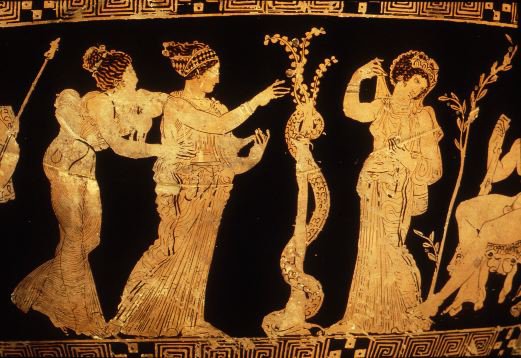
Eurystheus commanded Hercules to bring him golden apples which belonged to Zeus, king of the gods. Hera had given these apples to Zeus as a wedding gift, so surely this task was impossible. Hera, who didn't want to see Hercules succeed, would never permit him to steal one of her prize possessions, would she?
These apples were kept in a garden at the northern edge of the world, and they were guarded not only by a hundred-headed dragon, named Ladon, but also by the Hesperides, nymphs who were daughters of Atlas, the titan who held the sky and the earth upon his shoulders.
Hercules' first problem was that he didn't know where the garden was. He journeyed through Libya, Egypt, Arabia, and Asia, having adventures along the way. He was stopped by Kyknos, the son of the war god, Ares, who demanded that Hercules fight him. After the fight was broken up by a thunderbolt, Hercules continued on to Illyria, where he seized the sea-god Nereus, who knew the garden's secret location. Nereus transformed himself into all kinds of shapes,trying to escape, but Hercules held tight and didn't release Nereus until he got the information he needed.
Continuing on his quest, Hercules was stopped by Antaeus, the son of the sea god, Poseidon, who also challenged Hercules to fight. Hercules defeated him in a wrestling match, lifting him off the ground and crushing him, because when Antaeus touched the earth he became stronger. After that, Hercules met up with Busiris, another of Poseidon's sons, was captured, and was led to an altar to be a human sacrifice. But Hercules escaped, killing Busiris, and journeyed on.
Hercules came to the rock on Mount Caucasus where Prometheus was chained. Prometheus, a trickster who made fun of the gods and stole the secret of fire from them, was sentenced by Zeus to a horrible fate. He was bound to the mountain, and every day a monstrous eagle came and ate his liver, pecking away at Prometheus' tortured body. After the eagle flew off, Prometheus' liver grew back, and the next day he had to endure the eagle's painful visit all over again. This went on for 30 years, until Hercules showed up and killed the eagle.
In gratitude, Prometheus told Hercules the secret to getting the apples. He would have to send Atlas after them, instead of going himself. Atlas hated holding up the sky and the earth so much that he would agree to the task of fetching the apples, in order to pass his burden over to Hercules. Everything happened as Prometheus had predicted, and Atlas went to get the apples while Hercules was stuck in Atlas' place, with the weight of the world literally on his shoulders.
When Atlas returned with the golden apples, he told Hercules he would take them to Eurystheus himself, and asked Hercules to stay there and hold the heavy load for the rest of time. Hercules slyly agreed, but asked Atlas whether he could take it back again, just for a moment, while the hero put some soft padding on his shoulders to help him bear the weight of the sky and the earth. Atlas put the apples on the ground, and lifted the burden onto his own shoulders. And so Hercules picked up the apples and quickly ran off, carrying them back, uneventfully, to Eurystheus.
There was one final problem: because they belonged to the gods, the apples could not remain with Eurystheus. After all the trouble Hercules went through to get them, he had to return them to Athena, who took them back to the garden at the northern edge of the world.
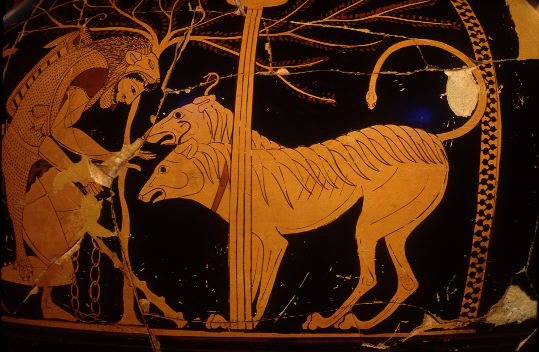
The ancient Greeks believed that after a person died, his or her spirit went to the world below and dwelled for eternity in the depths of the earth. The Underworld was the kingdom of Hades, also called Pluto, and his wife, Persephone. Depending on how a person lived his or her life, they might or might not experience never-ending punishment in Hades. All souls, whether good or bad, were destined for the kingdom of Hades.
Cerberus was a vicious beast that guarded the entrance to Hades and kept the living from entering the world of the dead. According to Apollodorus, Cerberus was a strange mixture of creatures: he had three heads of wild dogs, a dragon or serpent for a tail, and heads of snakes all over his back. Hesiod, though, says that Cerberus had fifty heads and devoured raw flesh.
Among the children attributed to this awful couple were Orthus (or Othros), the Hydra of Lerna, and the Chimaera. Orthus was a two-headed hound which guarded the cattle of Geryon. With the Chimaera, Orthus fathered the Nemean Lion and the Sphinx. The Chimaera was a three-headed fire-breathing monster, part lion, part snake, and part goat. Hercules seemed to have a lot of experience dealing with this family: he killed Orthus, when he stole the cattle of Geryon, and strangled the Nemean Lion. Compared to these unfortunate family members, Cerberus was actually rather lucky.
Before making the trip to the Underworld, Hercules decided that he should take some extra precautions. This was, after all, a journey from which no mortal had ever returned. Hercules knew that once in the kingdom of Hades, he might not be allowed to leave and rejoin the living. The hero went to Eleusis and saw Eumolpus, a priest who began what were known as the Eleusinian Mysteries. The mysteries were sacred religious rites which celebrated the myth of Demeter and her daughter Persephone. The ancients believed that those who learned the secrets of the mysteries would have happiness in the Underworld. After the hero met a few conditions of membership, Eumolpus initiated Hercules into the mysteries.
Hercules went to a place called Taenarum in Laconia. Through a deep, rocky cave, Hercules made his way down to the Underworld. He encountered monsters, heroes, and ghosts as he made his way through Hades. He even engaged in a wrestling contest! Then, finally, he found Pluto and asked the god for Cerberus. The lord of the Underworld replied that Hercules could indeed take Cerberus with him, but only if he overpowered the beast with nothing more than his own brute strength.
A weaponless Hercules set off to find Cerberus. Near the gates of Acheron, one of the five rivers of the Underworld, Hercules encountered Cerberus. Undaunted, the hero threw his strong arms around the beast, perhaps grasping all three heads at once, and wrestled Cerberus into submission. The dragon in the tail of the fierce flesh-eating guard dog bit Hercules, but that did not stop him. Cerberus had to submit to the force of the hero, and Hercules brought Cerberus to Eurystheus. Unlike other monsters that crossed the path of the legendary hero, Cerberus was returned safely to Hades, where he resumed guarding the gateway to the Underworld. Presumably, Hercules inflicted no lasting damage on Cerberus, except, of course, the wound to his pride!